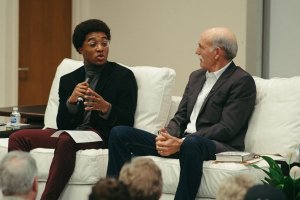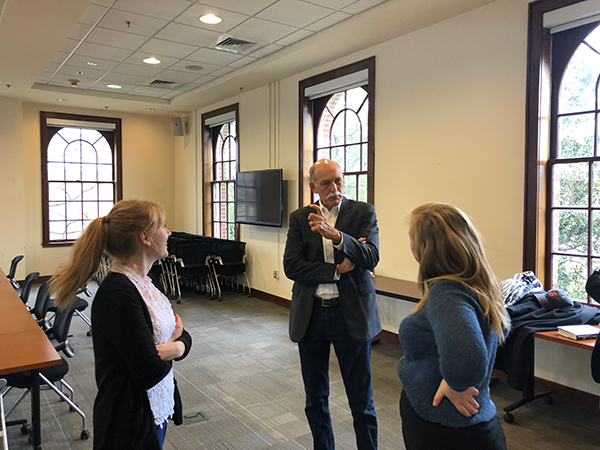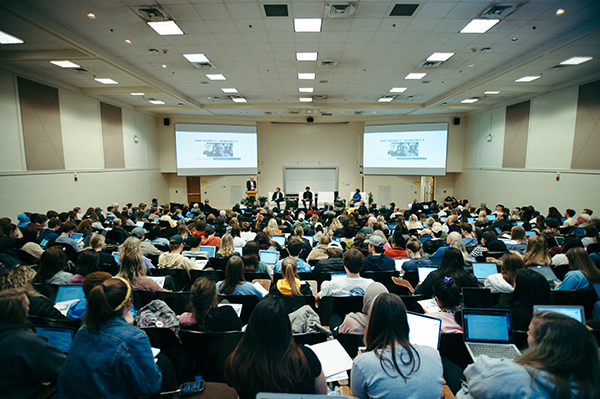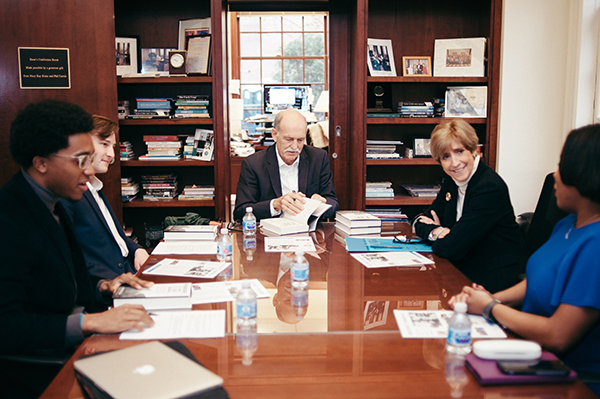David Zucchino joins UNC Hussman students and faculty to discuss race, history and ‘Wilmington’s Lie’

UNC Hussman students packed the room this week to hear Pulitzer Prize-winning journalist David Zucchino ’73 in a discussion that started with a historical focus but expanded into parallels and lessons for today’s journalism and media students.
Zucchino’s new book “Wilmington’s Lie: The Murderous Coup of 1898 and the Rise of White Supremacy” tells the little-known story of the Wilmington coup of 1898 in which North Carolina’s white supremacists overthrew the state legislature in a violent uprising, leaving at least 60 dead.
He spent the day at UNC Hussman, speaking in the Holding Power Accountable Lecture Series, visiting classes, being interviewed by students from the Media Hub capstone course and delivering the Nelson Benton Lecture, where he was joined on stage for a discussion with Associate Professor Trevy McDonald and students Charlie McGee ’20 and Excellence Perry ’21.
Now at The New York Times, Zucchino is a Pulitzer Prize winner and four-time finalist and has covered wars and civil conflicts in more than three dozen countries. But he has returned to UNC Hussman throughout the years as an adjunct professor and lecturer and values his connection with the school. “I only wish I was a student at the school now,” Zucchino said. “The opportunities and the range of skills and professional preparation available today is truly impressive. It's without a doubt the best journalism school in the country.”

Zucchino’s visit was made possible through the Nelson Benton Lecture Series, established by family and friends of longtime CBS News journalist Nelson Benton after his death in 1988. Benton, who began his broadcasting career at radio station WSOC in Charlotte after receiving his degree from UNC in 1949, went on to serve as an Emmy-winning television news correspondent.
“David’s work on ‘Wilmington’s Lie’ is a deep dive into journalism at its best,” Dean Susan King said. “His time at UNC Hussman is always so valuable for our students, and we know Nelson Benton would be proud to see his legacy continued with this lecture.”
Zucchino grew interested in the Wilmington coup because, though he attended high school and college in North Carolina, he never heard about the white supremacist violence in Wilmington the 1990s. He was pleasantly surprised that Hussman students were in a different position — many in the room were familiar with the history.
McDonald, who moderated the discussion, covers the Wilmington events in her Black Press and U.S. History class every spring. She says that knowledge of the massacre is crucial for students: “The Wilmington Massacre of 1898 is the only successful coup d’état in U.S. history, yet it is not widely known. Although it was premeditated, strategically planned, promoted and widely publicized, state and federal government did nothing to prevent it, nor were the perpetrators ever held accountable,” she said. When Zucchino visited her class before the Benton Lecture, her students were aware of the topic’s weight. “They asked poignant questions and explored this topic beyond the scope of class readings,” McDonald said.
At the lecture, McDonald and student panelists McGee and Perry asked Zucchino what lessons the Wilmington violence has for journalists today. Zucchino appreciated Perry’s questions on the importance of who controls history’s narrative. He pointed out that the white supremacists of the time were “brilliant” in how they used the media. ,” Zucchino said their main weapon was a “fake news campaign” and that it demonstrates to what extent history can be written falsely.

Zucchino also outlined how some of those involved in Wilmington had connections to UNC-Chapel Hill’s own difficult racial history. Perry later praised UNC Hussman for hosting the conversation. “I was very impressed and honored to be a part of a professional school that sought out David knowing his subject matter was so sensitive,” he said. “It shows me that as journalists we value truth and reality over a potentially spotless image.” Perry called the lecture a wakeup call for students and said Zucchino showed the audience how “the ideas of prior generations still have an impact on our generation and on our campus.”
In an interview with King for her Start Here / Never Stop podcast, Zucchino expanded on that idea. “The book is so relevant to what's happening right now to our national discussion about race, and how stories involving race are told,” he said. “I wanted to tell it as a human story — as a narrative — and correct the historical record."
Zucchino also outlined his journalistic approach to research — including many hours spent at UNC’s Wilson Library — and his work with primary sources like journals, articles and even textbooks from the 1890s. As Zucchino told King in the podcast, many of the sources he included in the book were “stomach churning" (listen to the full episode below or here).
The students in the audience of the Benton Lecture were particularly glued to Zucchino’s accounts of finding shocking details in those writings. As he read excerpts from textbooks — including one passage about the origin of the KKK — students audibly gasped and whispers of “oh my god” were heard in the room.
McGee, The Daily Tar Heel's investigations team editor who was responsible for many of the paper’s scoops around the Silent Sam controversy, focused his questions on drawing parallels between the laws and historical events in Zucchino’s research and today’s most pressing problems. “I think it was important that we connected the characters and history of this event with current-day issues, like voter suppression of poor and minority communities,” he said. Zucchino and the panel explored how the fight over who gets to frame history echoes for Carolina students today around issues such as the Silent Sam controversy.
"A lesson I think all journalists can draw from a panel like this is that it's important to learn and understand uncomfortable histories, because it can allow us to inform the public in new, crucial ways," McGee noted.

“Our students continue to demonstrate the power of the experiences the school’s faculty and staff provide,” King said. “In thoughtful discussions with David throughout the day, they showcased their knowledge, curiosity and experience — while absorbing the valuable lessons David shared from his fascinating career.”
In the podcast with King, Zucchino discussed his remarkable path in journalism. He reflected on his 18 years in Afghanistan, where he embedded with troops and told stories of the Afghan people on the ground — and on how he eventually got back to researching North Carolina’s history. Looking back on his time as a foreign correspondent, Zucchino also praised UNC’s “global guarantee” to provide its students with a global perspective. He said he wished he had had that opportunity and urged UNC Hussman students to explore the world around them. But, after spending the day at the school, he’s not worried about the path ahead for students.
“They're all so energetic, dynamic and committed — and so much smarter and more aware than I was at that age,” Zucchino said. “The future of journalism is in good hands.”
For more from David Zucchino, including his most important piece of advice for students, listen to his interview with Dean Susan King on the Start Here / Never Stop podcast: